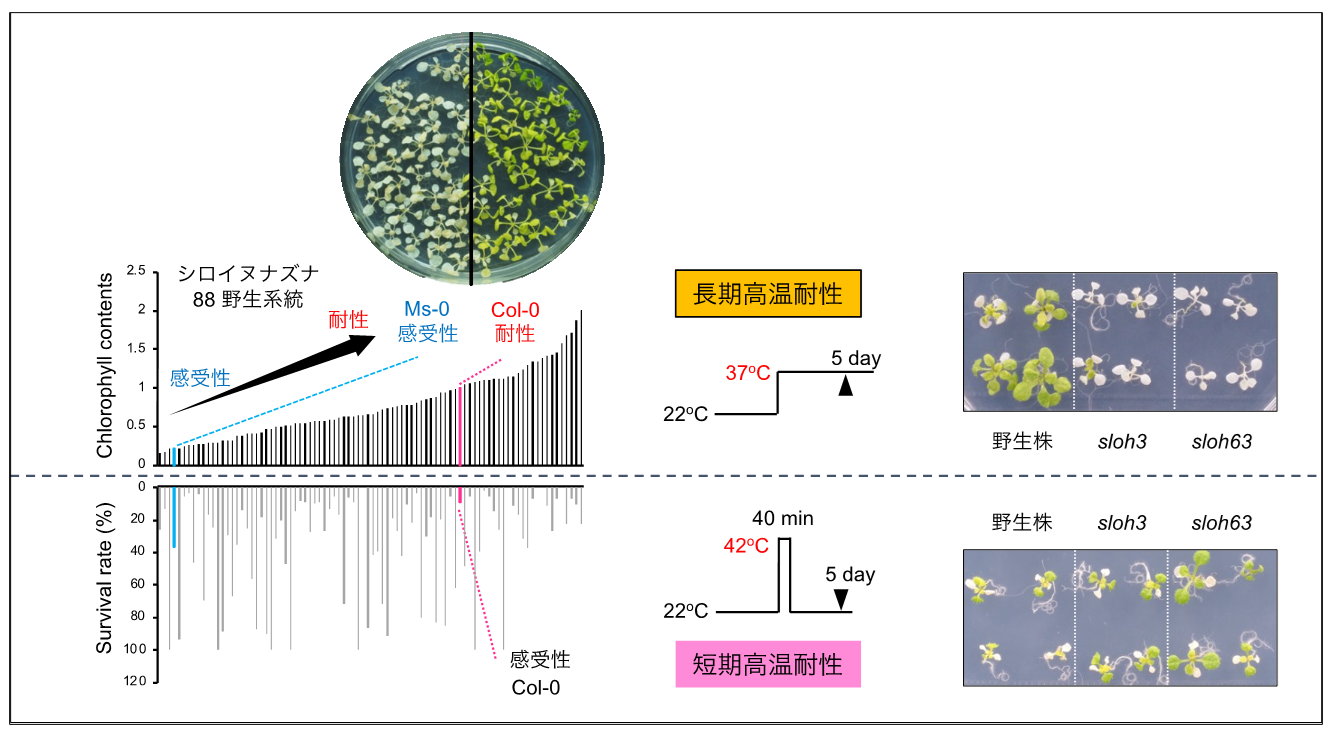DATE2023.11.14 #Press Releases
Accurate mRNA splicing is important for long-term high temperature stress tolerance in plants (2 reports published simultaneously)
Disclaimer: machine translated by DeepL which may contain errors.
〜Crop Breeding to Adapt to High Temperatures that Last for Days on End
Tokyo University of Agriculture
Kyushu Institute of Technology
Graduate School of Science, The University of Tokyo
RIKEN
Summary of Presentations
Recent temperature increases have reduced crop yields, and elucidating the mechanisms of plant tolerance to high temperatures and creating tolerant crops has become an important issue in plant science. A joint research group of Kyushu Institute of Technology, The University of Tokyo, and RIKEN, led by Professor Teruaki Taji of The Tokyo University of Agriculture, has 1) discovered the LHT1 gene that contributes to long-term high temperature stress tolerance in wild strains of Arabidopsis thaliana that show tolerance and high sensitivity to long-term high temperature stress, and 2) identified the LHT1 gene that contributes to long-term Arabidopsis sloh3 and sloh63 mutants defective in high temperature tolerance were isolated and the causal genes were identified.
These genes were MOS4-related complex genes encoding RNA helicases involved in mRNA splicing. In Arabidopsis wild lines, which are highly susceptible to long-term high temperatures, and in sloh3 and sloh63 mutant lines, detrimental splicing events were widely observed under long-term high temperature stress. These findings indicate that maintenance of accurate mRNA splicing of the MOS4-related complex is essential for long-term high temperature tolerance. The results of this study will lead to crop breeding adapted to high temperatures lasting for many days.

Figure: Long-term (top) and short-term (bottom) high temperature tolerance in Arabidopsis thaliana.
Left: Long-term (top) and short-term (bottom) high temperature tolerance in Arabidopsis wild lines (line 88).
Although the same wild lines are shown above and below, wild lines showing long-term high temperature tolerance do not necessarily show short-term high temperature tolerance, suggesting that the tolerance mechanisms differ between long-term and short-term.
Right: Long-term high temperature tolerance (top) and short-term high temperature tolerance (bottom) of Arabidopsis mutant lines sloh3 and sloh63.
Although the sloh3 and sloh63 mutants are susceptible to long-term high-temperature stress, their short-term high-temperature tolerance is comparable to that of wild-type plants, suggesting that only long-term high-temperature tolerance is defective.
Professor Takashi Tsuchimatsu of the Department of Biological Sciences, Graduate School of Science, The University of Tokyo contributed to this research.
The results of this research (1) and (2) were published simultaneously in "PNAS Nexus" .
For details, please visit the website of Tokyo University of Agriculture.(in Japanese).
Journal
-
Journal name PNAS NexusPaper 1 Paper 2


